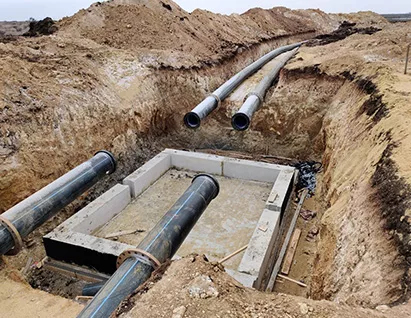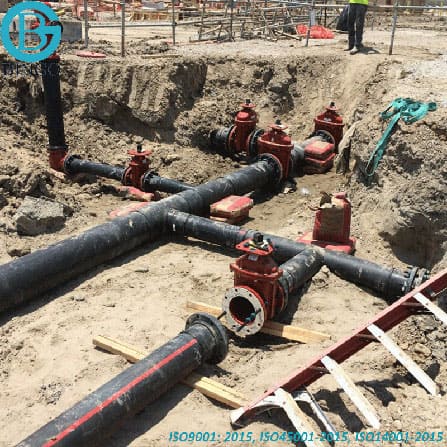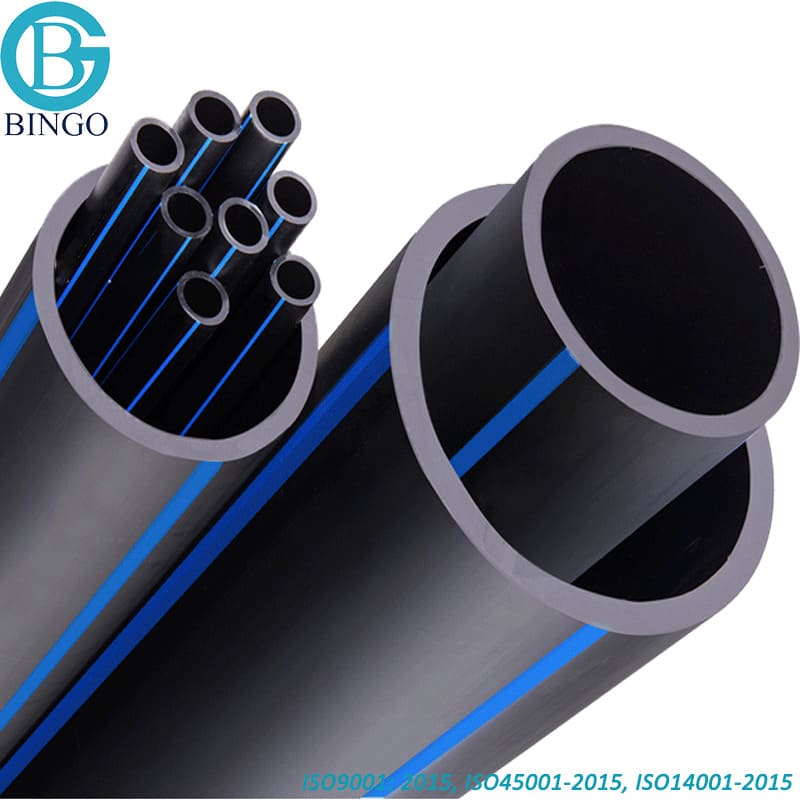Discovering the Leading Pipeline Manufacturers: High Quality, Reliability, and Development
The pipeline manufacturing market stands at the crossway of quality, development, and integrity, driven by leading companies such as Tenaris and Vallourec. These manufacturers are not only devoted to creating high-performance materials however are additionally pioneering lasting methods that resolve modern-day ecological concerns (HDPE Pipe Supplier). As we check out the criteria that define excellence in pipeline options, it becomes evident that the landscape is rapidly evolving. What specific technologies are emerging, and exactly how are these developments shaping the future of pipeline facilities? The responses might redefine market requirements in methods that are not yet fully understood
Leading Manufacturers Review
In the domain name of pipeline manufacturing, several key gamers arise as leaders, each contributing considerably to the industry's landscape. Firms such as Tenaris, Vallourec, and JFE Steel have established themselves as frontrunners by consistently delivering top notch items that fulfill rigorous sector criteria. Tenaris, renowned for its cutting-edge solutions, specializes in seamless and welded pipelines, providing mainly to the oil and gas field. Vallourec, a French international, concentrates on the manufacturing of premium tubular solutions, stressing sustainability and advanced modern technology in its manufacturing processes.
JFE Steel, a major Japanese manufacturer, is identified for its considerable variety of steel pipes, especially those used in power and facilities tasks. Their commitment to r & d has allowed them to produce high-performance products that endure harsh ecological conditions. In addition, companies like united state Steel and National Oilwell Varco have broadened their market visibility by diversifying their item offerings and enhancing functional efficiencies.
These leading suppliers not only dominate the market however additionally drive innovation within the industry, establishing criteria for quality and integrity that gamers strive to attain. Their payments are essential for fulfilling the raising demand for sturdy and effective pipeline options worldwide.
Standards for Quality Analysis
Quality assessment in pipeline manufacturing depends upon 2 important criteria: material longevity standards and making process efficiency. Making sure that materials meet extensive longevity standards is necessary for the longevity and integrity of pipes. In addition, maximizing the manufacturing process can enhance performance while preserving premium quality, eventually impacting total efficiency and safety.
Product Toughness Requirements
Ensuring the longevity and dependability of pipeline materials is important for maintaining infrastructure integrity and operational efficiency. Product resilience requirements play a crucial function in assessing the high quality of pipelines, determining the efficiency and life expectancy of the materials used in construction. Manufacturers must stick to a series of extensive requirements, including those established by companies such as ASTM International and the American Petroleum Institute (API)
These criteria review numerous factors, including deterioration resistance, tensile toughness, and exhaustion efficiency. For example, pipelines used in corrosive settings need materials that can endure chemical destruction, while those subjected to high-pressure problems need to display outstanding tensile stamina.
In addition, factors such as temperature level fluctuations and environmental conditions need to be thought about, as these can considerably influence material behavior in time. Manufacturers commonly use advanced testing approaches, including increased aging examinations, to mimic long-lasting wear and assurance that materials meet or surpass industry criteria.
Manufacturing Process Performance
Manufacturers' capability to maximize making process performance is important for creating high-quality pipelines that fulfill rigid industry requirements. Effectiveness in making directly influences cost administration, manufacturing timelines, and total product stability. To accomplish this, leading pipeline manufacturers implement innovative techniques such as lean manufacturing, automation, and real-time data analytics.
Lean producing principles are essential in lessening waste and making the most of resource usage. By enhancing processes and eliminating redundancies, producers can improve efficiency while ensuring regular high quality. Automation innovations, including robotics and computer mathematical control (CNC) equipments, play a pivotal role in enhancing accuracy and lowering human mistake, therefore boosting the dependability of the end product.
In addition, using real-time information analytics enables producers to keep an eye on manufacturing procedures continuously, allowing them to identify traffic jams and make timely adjustments. This proactive approach not just improves efficiency yet also sustains top quality assurance methods by guaranteeing conformity with regulatory requirements.
Integrity in Pipeline Solutions
Dependability in pipeline remedies is critical, as it straight influences the security and efficiency of fluid transportation systems. Secret factors consist of the longevity of materials made use of, adherence to extensive testing and qualification criteria, and the incorporation of innovative product options that enhance efficiency. Understanding these components is necessary for makers aiming to supply reliable pipeline framework.
Importance of Sturdiness
Attaining sturdiness in pipeline options is crucial, as it directly influences the long-term efficiency and safety and security of framework. Resilient pipes are necessary for decreasing maintenance expenses and minimizing the probability of disastrous failings. This reliability is especially important in markets such as oil and gas, water supply, and wastewater administration, where the effects of pipeline failing can be extreme, both economically and ecologically.
The products and manufacturing processes utilized by pipeline suppliers play a significant function in determining the toughness of the end product. Using high-quality resources, progressed innovations, and innovative layout concepts guarantees that pipelines can endure different stress factors, including pressure changes, temperature variations, and harsh atmospheres.
Furthermore, the resilience of pipes is carefully connected to their ability to stand up to outside factors such as dirt activity, seismic task, and chemical exposures. Effective deterioration protection techniques, such as finishings and cathodic security, even more enhance the longevity of pipes, guarding them against deterioration over time.
Purchasing sturdy pipeline services eventually translates to boosted functional efficiency, reduced downtime, and improved safety and security, attesting the crucial significance of durability in contemporary pipeline manufacturing.
Evaluating and Accreditation Standards
In the domain of pipeline services, rigorous screening and accreditation requirements are important to guarantee the integrity and security of framework. These requirements act as standards for assessing the efficiency and toughness of pipeline materials and systems, validating they meet particular regulatory and sector needs.
Examining procedures commonly incorporate various approaches, consisting of stress testing, hydrostatic evaluations, and non-destructive screening methods. These assessments are vital for recognizing potential weak points or issues in the products before they are released in real-world applications. Furthermore, accreditation by identified companies warranties that producers abide by established standards, which promotes trust fund among stakeholders, including designers, specialists, and end-users.
Several top pipeline manufacturers engage in constant surveillance and renovation of their screening protocols to adapt to evolving industry criteria and technical improvements. Conformity with standards such as ASTM, ASME, and ISO not just improves item dependability however likewise minimizes the threat of environmental cases related to pipeline failures.
Cutting-edge Material Solutions
The growth of ingenious material remedies has transformed the landscape of pipeline manufacturing, enhancing both efficiency and durability. Advanced products such as high-density polyethylene (HDPE), cross-linked polyethylene (PEX), and composite materials have actually arised as game-changers, providing premium resistance to deterioration, temperature changes, and stress variations. These materials not just prolong the life expectancy of pipes but likewise minimize upkeep costs, ensuring reputable long-term efficiency.
Manufacturers are increasingly taking on clever materials that include sensing units for real-time monitoring. This technology permits positive maintenance, substantially enhancing reliability by finding leaks or architectural weaknesses prior to they escalate right into important failings. The integration of nanotechnology has actually additionally led to the growth of layers that improve the toughness of pipes against abrasion and chemical exposure.
Sustainability is another vital emphasis, with manufacturers discovering bio-based compounds and recyclable materials that lessen ecological influence. As regulatory criteria continue to progress, the emphasis on ingenious product solutions comes to be vital in meeting rigid security and environmental needs. Ultimately, these improvements not just boost the integrity browse around this site of pipeline systems yet additionally add to the overall effectiveness and sustainability of energy transportation infrastructures.
Innovations in Pipeline Technology
Developments in pipeline innovation are transforming the market by improving performance, safety, and environmental sustainability. Recent advancements concentrate on clever pipeline systems that make use of sensors and IoT innovation to check problems in real time, enabling positive upkeep and reducing the risk of failures. These systems can discover leakages, stress adjustments, and various other anomalies, permitting rapid feedback and reducing ecological effect.
In addition, the development of sophisticated products, such as corrosion-resistant and composite alloys, significantly extends the lifespan and reliability of pipelines. HDPE Pipe Supplier (HDPE Pipe Supplies Midland TX). These products decrease maintenance prices and enhance performance in rough atmospheres, making them excellent for water, gas, and oil transportation
Moreover, automation and robotics are playing an important function in pipeline building and inspection. Drones and robot gadgets help with surveys and analyses of hard-to-reach areas, making certain detailed inspections without endangering safety.
Cutting-edge styles, such as modular pipeline systems, allow for better flexibility in installation and alteration, providing to the vibrant demands of the power sector. With each other, these technological improvements not only improve functional performance however also add to a more resilient and lasting pipeline infrastructure, leading the way for a greener future.
Study of Success
Across different industries, successful implementations of innovative pipeline technologies demonstrate significant enhancements in functional performance and security. One notable instance is the release of clever pipeline monitoring systems in the oil and gas sector, where real-time information analytics have actually reduced leak discovery times by over 50%. This not only reduces environmental threats but additionally enhances the general honesty of pipeline framework.

Additionally, a significant manufacturer carried out robot assessment innovations in its pipeline maintenance procedures, leading to a 40% renovation in evaluation performance. This approach has structured upkeep schedules and substantially lowered downtime.
These instance research studies highlight just how prominent pipeline producers are leveraging advanced modern technologies to foster integrity and operational quality, eventually establishing brand-new criteria for the industry. As these successes continue to unfold, they lead the way for further improvements in pipeline manufacturing and monitoring.

Environmental Sustainability Practices
Regularly, pipeline manufacturers are prioritizing ecological sustainability practices to alleviate their environmental footprint and enhance the durability of their products. This commitment is shown in various initiatives focused on reducing waste, conserving power, and using sustainable products throughout the manufacturing process.

Many manufacturers are taking on advanced innovations that minimize emissions and power intake. The integration of automated systems and energy-efficient machinery assists enhance production while decreasing dependence on fossil gas. Furthermore, firms are significantly turning to environment-friendly materials, such as recycled metals and bioplastics, which not only lower the environmental impact yet additionally promote a circular economic climate.
Moreover, pipeline makers are applying extensive lifecycle assessments to evaluate the ecological implications of their items from creation to disposal. This technique enables them to identify chances for renovation and foster responsible sourcing and waste administration methods.
Cooperation with environmental companies additionally enhances these initiatives, as producers look for to align their procedures with international sustainability objectives. Eventually, these ecological sustainability techniques not just add to a healthier earth yet also setting suppliers as accountable leaders in the market, attracting ecologically conscious stakeholders and clients alike.
Future Fads in Pipeline Manufacturing
As the demand for extra effective and sustainable infrastructure expands, pipeline manufacturing is positioned for substantial innovations that will reshape the sector. Trick trends expected in the coming years include the combination of advanced products, such as composite and corrosion-resistant alloys, which boost durability while minimizing ecological impact. Manufacturers are likewise anticipated to embrace cutting-edge production strategies, like additive manufacturing and automation, to simplify processes, lower waste, and reduced costs.
The increase of clever pipeline innovations, integrating sensing units and IoT devices, will allow real-time surveillance and predictive maintenance, thereby enhancing security and operational effectiveness. This digital makeover will not only optimize resource management however additionally assist in compliance with strict environmental regulations.
Sustainability will certainly remain a main focus, driving manufacturers to buy environment-friendly methods, including energy-efficient production techniques and reusing initiatives. As the worldwide focus on climate adjustment heightens, pipeline manufacturers will certainly require to adapt by creating services that meet both environmental and financial demands.
Regularly Asked Concerns

What Industries Mainly Make Use Of Pipeline Products From These Manufacturers?
Pipeline products are primarily made use of in markets such as oil and gas, wastewater and water monitoring, chemical building and construction, mining, and handling. These markets count on effective, resilient, and safe transportation of liquids and products.
Just How Do Manufacturers Ensure Conformity With International Pipeline Standards?
Manufacturers assure compliance with worldwide pipeline requirements by applying extensive quality assurance procedures, conducting routine examinations, adhering to established regulatory structures, and buying worker training to promote recognition and understanding of security and quality needs.
What Is the Average Lifespan of Pipelines From Leading Manufacturers?
The typical life-span of pipelines from leading producers usually ranges from 30 to 100 years, depending on material, environmental conditions, and upkeep techniques. American Plastics LLC HDPE Pipeline Manufacturer. Regular assessments and adherence to market requirements considerably influence durability and efficiency
Are There Certifications Details to Pipeline Manufacturing Top Quality?
Yes, various certifications exist for pipeline producing quality, including ISO 9001 for quality administration systems and API standards specific to pipes. These accreditations ensure adherence to rigorous safety and security, efficiency, and environmental standards within the sector.
How Do Manufacturers Manage Pipeline Maintenance and Repair Works?
Manufacturers typically carry out a positive upkeep strategy that consists of normal evaluations, monitoring systems for early discovery of concerns, and a structured repair service method. This method assurances pipeline integrity, minimizes downtime, and boosts overall operational efficiency.
Quality assessment in pipeline manufacturing hinges on 2 vital criteria: material sturdiness standards and producing procedure performance - Pipeline Manufacturer. Material durability standards play an essential function in assessing the quality of pipelines, determining the efficiency and lifespan of the products utilized in building. The products and producing processes used by pipeline manufacturers play a considerable function in determining the toughness of the final product. The average life expectancy of pipelines from leading producers usually ranges from 30 to 100 years, depending on material, ecological conditions, and upkeep methods. Yes, various qualifications exist for pipeline making high quality, including ISO 9001 for quality management systems and API criteria certain to pipelines